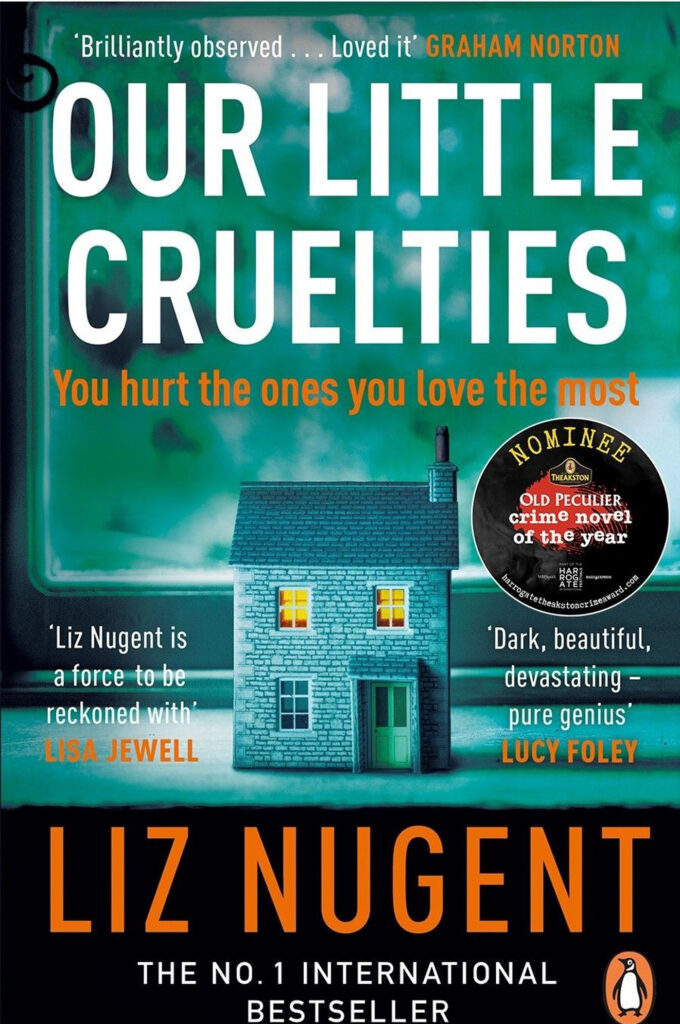Liz Nugent, Our Little Cruelties
Review by Lee Horsley
In Our Little Cruelties (2020), Liz Nugent again demonstrates her extraordinary ability to bring to life characters who both repel and fascinate us. One of the most darkly noir of contemporary crime writers, she excels in the creation of tense, gripping dramas about people imprisoned in their own obsessions and their catastrophic errors of judgement.
The opening of Our Little Cruelties is set at a funeral. One of the three Drumm brothers is dead. We are told that the death was sudden and horrific, and that an investigation was swiftly concluded, but we don’t know which brother is dead, nor do we know which one is narrating:
“As the service began, I became tearful. Without ever realizing it, I had inherited my mother’s acting abilities. My living brother and I stood, side by side, at the top of the crematorium while people lied to us about what a brilliant man our brother had been…”
The chapter sets the scene for a novel that ruthlessly exposes the dynamics of a dysfunctional family. All three brothers have been, in their very different ways, shaped by the monstrous narcissism of their mother, who, with her arrogance and “acting abilities”, dominates them all, including their loving but weak father. Self-pitying and cruel, particularly towards one another, the brothers jockey for supremacy, forming alliances that are invariably fragile and temporary.
Family dinners in their childhood epitomise the resentments and the competition for ascendancy that will dominate the rest of their lives, driving the fear of being seen as “the loser brother”. Their long-suffering father tries to treat them equally, but when their mother is home it’s a very different dinner table: as Brian recalls, “When Mum cooked, Will always got bigger portions than me, and Luke got the smallest.”
The eldest, Will, appears to possess all the natural advantages – a charming and predatory misogynist who becomes a film producer, he is his mother’s favourite. Brian, the middle child, seems more self-effacing, but is also manipulative, harbouring resentments and nursing grievances. Luke, the baby of the family, is the least favoured and would appear to be the most disturbed, given to religious mania and bouts of hysteria. He surprises them all with his sudden emergence as a rock star, rising to a level “of fame, and infamy” which for a time makes him a fortune. But he is unable to leave his instability behind, and the family’s irretrievably tangled adult relationships propel the plot forward to its grimly satisfying conclusion.
From the opening scenes, readers experience the sense of claustrophobic entrapment that so often dominates the novels of classic noir, heightened in Nugent’s work by her technique of moving back and forth amongst the perceptions of different characters. Her unfailingly suspenseful plots are played out through alternating perspectives, exploring each character’s inner world, their misconceptions and their fears of being caught out in the lies they’ve told. Calamitous errors are bred of their own obsessions, their deceits and their idiosyncratic relationship to reality.
Nugent’s four novels to date – in addition to Our Little Cruelties, Unravelling Oliver (2014), Lying in Wait (2016) and Skin Deep (2018) – establish her reputation as one of the finest contemporary writers of psychological noir, giving readers savage insights into an unforgettable gallery of damaged, dysfunctional characters whose duplicity repeatedly ruins the lives of those around them and who can’t ultimately escape the consequences of their own self-deception.


